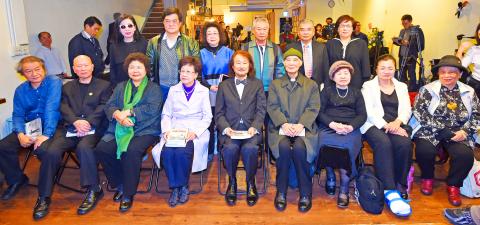Remembering the past while looking forward to the future, about a dozen former democracy activists gathered in Taipei yesterday to commemorate the 35th anniversary of the Formosa Incident, saying that they are optimistic about the future of Taiwan’s democracy because of recent pro-democracy movements.
The Formosa Incident, also known as the Kaohsiung Incident, involved an anti-government demonstration organized by Formosa Magazine on Dec. 10, 1979. Intended as a march in honor of International Human Rights Day, the event turned violent when members of the crowd unknown to the organizers — and widely believed to have been agents provocateurs — began attacking police. The Chinese Nationalist Party (KMT) government court-martialed and jailed eight activists, who became known as the Kaohsiung Eight.
Speaking at an event in Taipei to commemorate the Incident, and to launch a book on it, former Democratic Progressive Party (DPP) chairman Hsu Hsin-liang (許信良) said that while it is still hard to foresee the outcome of the social movements — including the Sunflower movement, the demonstrations for human rights in military and several other movements for environmental or development issues — he is certain that they will bring about positive reforms to Taiwan’s democracy.

Photo: Liu Hsin-de, Taipei Times
“Most of what we pursued in the pro-democracy movements in the 1970s — such as direct election of the president — came to pass in the 1990s, so I’m sure that the problems facing this generation and which led to the recent social movements will be solved in a few decades, even though we may not foresee what will happen in the end,” Hsu told the audience.
“Issues facing Taiwan today — such as unequal distribution of wealth, cross-strait relations, and economic recession — exist because government leaders in the past two decades never thought about these issues, and therefore it’s natural that the civil society would want reforms,” Hsu said. “I’m optimistic that Taiwan’s democracy will deepen, and we should develop a Western European style of democracy.”
One of the Kaohsiung Eight — Shih Ming-te (施明德), lashed out against President Ma Ying-jeou’s (馬英九) leadership, saying that under Ma, the nation has lost its direction, and that Ma does not know how to handle cross-strait relations well, deals with the economy poorly and actively develops excessively close ties with large corporations.
Former vice president Annette Lu (呂秀蓮), who was another of the eight, thanked the public for remembering the pro-democracy activists of the past.
“I feel honored that we are still remembered,” Lu said. “The meaning behind remembering the Formosa Incident today is to pass on the value that we should always try to light up the world when it’s dark, and we should make it a value instilled in every Taiwanese.”
“No matter how we look forward to the future, we shall remember the past, for those without a sense of history cannot create the future,” she added.

Chinese Nationalist Party (KMT) Chairman Eric Chu (朱立倫), spokeswoman Yang Chih-yu (楊智伃) and Legislator Hsieh Lung-chieh (謝龍介) would be summoned by police for questioning for leading an illegal assembly on Thursday evening last week, Minister of the Interior Liu Shyh-fang (劉世芳) said today. The three KMT officials led an assembly outside the Taipei City Prosecutors’ Office, a restricted area where public assembly is not allowed, protesting the questioning of several KMT staff and searches of KMT headquarters and offices in a recall petition forgery case. Chu, Yang and Hsieh are all suspected of contravening the Assembly and Parade Act (集會遊行法) by holding

PRAISE: Japanese visitor Takashi Kubota said the Taiwanese temple architecture images showcased in the AI Art Gallery were the most impressive displays he saw Taiwan does not have an official pavilion at the World Expo in Osaka, Japan, because of its diplomatic predicament, but the government-backed Tech World pavilion is drawing interest with its unique recreations of works by Taiwanese artists. The pavilion features an artificial intelligence (AI)-based art gallery showcasing works of famous Taiwanese artists from the Japanese colonial period using innovative technologies. Among its main simulated displays are Eastern gouache paintings by Chen Chin (陳進), Lin Yu-shan (林玉山) and Kuo Hsueh-hu (郭雪湖), who were the three young Taiwanese painters selected for the East Asian Painting exhibition in 1927. Gouache is a water-based

Taiwan would welcome the return of Honduras as a diplomatic ally if its next president decides to make such a move, Minister of Foreign Affairs Lin Chia-lung (林佳龍) said yesterday. “Of course, we would welcome Honduras if they want to restore diplomatic ties with Taiwan after their elections,” Lin said at a meeting of the legislature’s Foreign Affairs and National Defense Committee, when asked to comment on statements made by two of the three Honduran presidential candidates during the presidential campaign in the Central American country. Taiwan is paying close attention to the region as a whole in the wake of a

OFF-TARGET: More than 30,000 participants were expected to take part in the Games next month, but only 6,550 foreign and 19,400 Taiwanese athletes have registered Taipei city councilors yesterday blasted the organizers of next month’s World Masters Games over sudden timetable and venue changes, which they said have caused thousands of participants to back out of the international sporting event, among other organizational issues. They also cited visa delays and political interference by China as reasons many foreign athletes are requesting refunds for the event, to be held from May 17 to 30. Jointly organized by the Taipei and New Taipei City governments, the games have been rocked by numerous controversies since preparations began in 2020. Taipei City Councilor Lin Yen-feng (林延鳳) said yesterday that new measures by